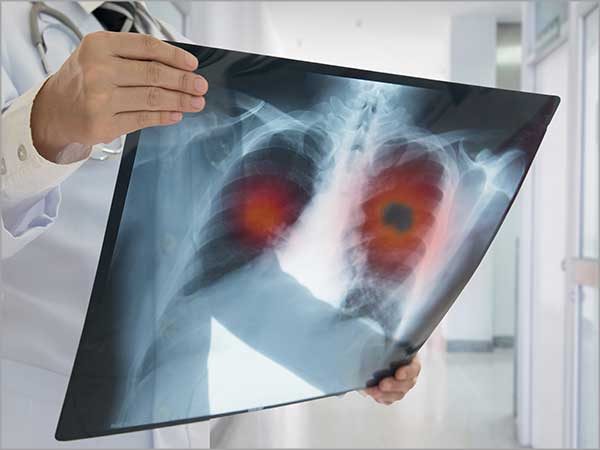Uncontrolled cell growth in the tissues of the lungs can result in the formation of a malignant tumour, also known as lung cancer. There are two types of lung carcinomas:
Types of Lung Cancer
There are two major types of Lung Cancer.
- Small Cell Lung Carcinoma: It is found almost exclusively in heavy smokers.
- Non-Small Cell Lung Carcinoma: This is a general term for several types of lung cancers such as adenocarcinoma, squamous cell carcinoma, and large cell carcinoma that behave similarly.
People who smoke are more prone to lung cancers. Risk of developing lung cancer increases proportionally with the number of cigarettes smoked and the period over which they have been smoked. You can considerably reduce your chances of developing lung cancer if you quit smoking, even after smoking for many years.
Symptoms
Lung cancer in its earliest stages typically doesn’t show any signs and symptoms. Symptoms start showing up only when the tumour has reached an advanced stage.

Signs and symptoms may include:
- Persistent cough
- Coughing up blood
- Difficulty in breathing
- Chest pain
- Hoarseness
- Unexplained weight loss
- Bone pain
- Headache
When to see a doctor
If you have any of these signs or symptoms make an appointment with your doctor immediately.
Risk factors for Lung Cancer
The risk of developing lung cancer may increase due to several factors. It is possible to control some risk factors while other factors can’t be controlled.
- Smoking
- Exposure to second-hand smoke
- Exposure to radon gas
- Workplace exposure to asbestos and other carcinogens such as chromium and arsenic
- A family history of lung cancer
How Smoking causes Lung Cancer
Smoking damages the cells that line the lungs thereby causing lung cancer. Cigarette smoke is full of carcinogens (cancer-causing substances), and when you inhale this smoke there will be changes in the lung tissue.
Initially, this damage gets repaired by your body. But normal cells that line your lungs get damaged beyond repair with repeated exposure. The damage causes cells to act abnormally over time, eventually leading to cancer.

Complications
- Shortness of breath
- Coughing up blood
- Pain
- Fluid in the chest (Pleural Effusion)
Prevention
You can reduce the risk of lung cancer but there is no sure way to prevent it:
- Quit smoking: Your doctor will be able to help you quit smoking with stop-smoking aids, nicotine replacement products, support groups and medications.
- Avoid second-hand smoke: Look for smoke-free options and avoid areas where people smoke
- Avoid carcinogens at work: You can wear a face mask for protection or ask your doctor what more you can do to protect yourself.
- Eat a diet full of vegetables and fruits: Make sure you are getting enough vitamins and nutrients from your food sources.
- Exercise regularly: If you don’t have the habit of exercising daily, start working out. Uncontrolled cell growth in the tissues of the lungs can result in the formation of a malignant tumour, leading to lung cancer.
Authored By Dr. M. Banupriya MBBS, MDRT, FIAMS, Ph.D, CCEPC (Palliative care), Consultant Oncologist



